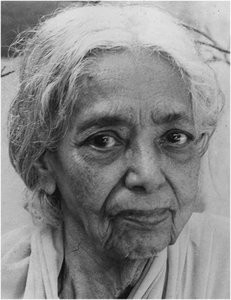

 |
 |
| Edavaleth Kakkat Janaki Ammal (04 Nov) 1897 - 1984 (07 Feb) |

| Known as "the botanist who sweetened India" for her work on sugarcane breeding, Dr. E. K. Janaki Ammal was a pioneer of cytology and cytogenetics and co-author of The Chromosome Atlas of Cultivated Plants in 1945. She was the first Indian woman to obtain a Ph.D. in Botany in the United States, as well as one of the few women elected to be a Fellow of the Indian National Science Academy at a time when most women did not have access to undergraduate education in India. Ammal was awarded her Ph.D. in botany from the University of Michigan in 1931 for her thesis titled "Chromosome Studies in Nicandra physaloides." Ammal then identified and hybridized high-yielding indigenous Indian sugarcanes, allowing the nation's sugar industry to become independent from the rest of Southeast Asia. Later in her career, Ammal turned her attention to full-time academics and joined C.D. Darlington at the Royal Horticultural Society, London to publish the first characterization of the chromosomes of over 10,000 species of flowering plants. Her ethnobotanical work consists of cytogenetic analysis of Asian and African flora, focusing on the highly evolutionarily active areas of Southeast Asia along the Eastern Himalayas. The recipient of numerous honorary degrees, fellowships, and awards, Ammal remained scientifically productive until her death in 1984. The internationally recognized Janaki Ammal Herbarium in Jammu, India was named in her honor and houses more than 21,000 specimens. |
| Meet India | Remembering Dr Janaki Ammal | Obituary and Resume |
| Rose Eponomy | The Pioneering Female Botanist | Celebrating STEM: Dr. Janaki Ammal | Natural Sciences Collection Association: "My Work Is What Will Survive" |
| Janaki Ammal Herbarium | Chromosome Atlas of Cultivated Plants. C. D. Darlington , E. K. Janaki Ammal |
| 1931. Janaki-Ammal, E.K.. Chromosome Studies in Nicandra Physaloïdes, by E.K. Janaki-Ammal .... (): . | Google Scholar |
| 1932. Darlington, C. D. and E. K. Janaki Ammal. The Origin and Behavior of Chiasmata. I. Diploid and Tetraploid Tulipa. Botanical Gazette (3): 296-312. | Google Scholar |
| 1941. Janaki-Ammal, E.K. . The Breakdown of Meiosis in a Male-Sterile Saccharum. Annals of Botany (17): 83-87. | Google Scholar |
| 1945. Darlington, C. D. and E. K. Janaki Ammal. Chromosome atlas of cultivated plants.. (): 397 pp.. | Google Scholar |
| 1945. DARLINGTON, C. D. and E. K. JANAKI-AMMAL. Adaptive Isochromosomes in Nicandra. Annals of Botany (35): 267-281. | Google Scholar |
| 1952. Ammal, E. K. Janaki and Barbara Saunders. Chromosome Numbers in Species of Lonicera. Kew Bulletin (4): 539-541. | Google Scholar |
| 1952. Ammal, E.K.J.. The Race History of Magnolias. (): . | Google Scholar |
| 1953. Ammal, E.K. Janaki. Chromosomes and the Species Problem in the Genus Viburnum. Current Science (1): 4-6. | Google Scholar |
| 1955. Ammal, C.D.D.J., E.K.J. Ammal and A.P. Wylie. Chromosome Atlas of Cultivated Plants. Chromosome Atlas of Flowering Plants. By C.D. Darlington and A.P. Wylie. (Second Edition.).. (): . | Google Scholar |
| 1958. Ammal, E.K.J.. Report on the Humid Regions of South Asia. (): . | Google Scholar |
| 1958. Ammal, E.K.J. and R.S. Raghavan. Polyploidy and Vitamin C in Emblica Officinalis Gaertn. (): . | Google Scholar |
| 1960. Ammal, E.K.J. and Indian Botanical Society. The Effect of the Himalayan Uplift on the Genetic Composition of the Flora of Asia. (): . | Google Scholar |
| 1964. Baruah, J.N., P.R. Rao and E.K.J. Ammal. Some Vegetable Tanning Materials of Assam. (): . | Google Scholar |
| 1974. Ammal, E.K.J.. Plants and Man. (): . | Google Scholar |